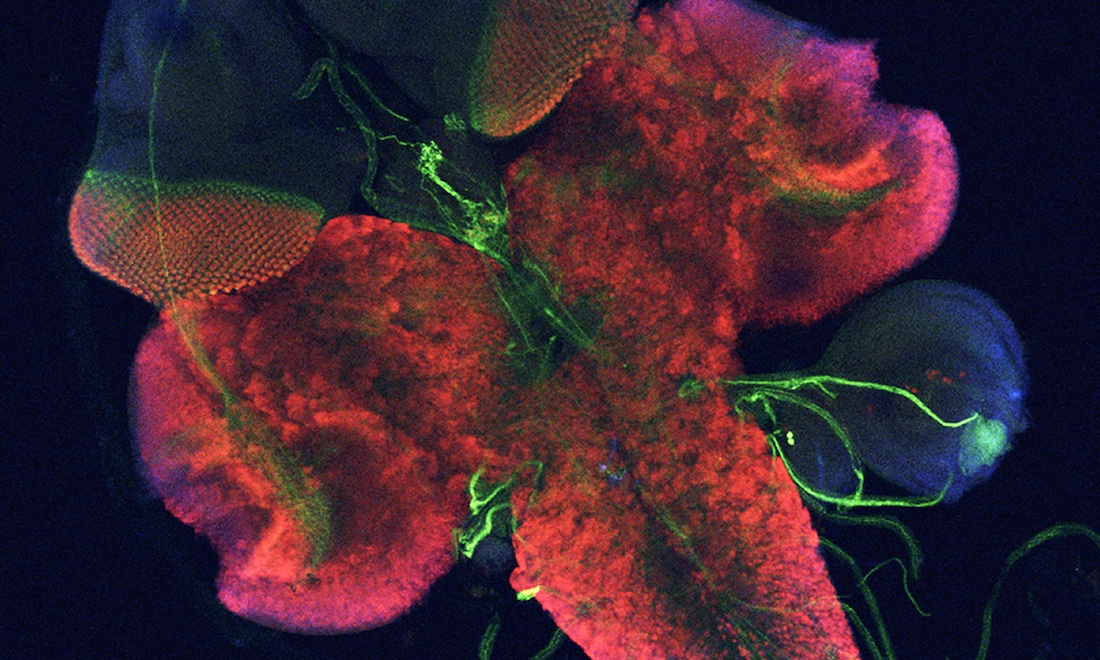Graduate Student Spotlight: Investigating the impact of maternal diets on brain development
August 4, 2022

Every other month, we highlight one of Van Andel Institute Graduate School’s doctoral students. This month features Ellen Griggs, a student in the lab of Dr. Heidi Lempradl. Griggs studies how maternal diets can affect brain development, aiming to bring a greater understanding to the underpinnings of behavioral differences in individuals.

Q: How would you describe your area of study to someone without a scientific background?
EG: I am really interested in how maternal diet can affect brain development. This is particularly interesting for neurodevelopmental disorders, such as autism, when there are such a variety of behaviors between individuals. I use fruit flies to look at the behavior of offspring from fathers who carry a high-risk mutation for autism and obese mothers. The hope is that we will be able to see whether diets affect overall brain development and have a greater understanding for what might be causing such behavioral differences.
Q: What do you want to do with your degree?
EG: Honestly, I’m not completely sure. I have always loved teaching and mentoring younger students, so I could see myself veering toward academia. But I am also really interested in environmental implications on neurobiology, so keeping in this general realm would be fantastic as well.
Q: Did you take time off before starting your Ph.D. degree or come directly from an undergraduate or master’s degree program?
EG: I did take about seven years off from school after my undergraduate degree. I dabbled in a couple of research labs/facilities before really figuring out what I enjoyed doing. And best of all, I was able to live in new places and meet a lot of great people along the way.
Q: How has your previous coursework contributed to your breadth of knowledge?
EG: It felt so long since my previous coursework when I started this degree — it was almost like starting from the beginning! Looking back though, I do think that my time away from the classroom helped my overall perspective. I’m not afraid to admit that I have a lot to learn, so I can focus on general learning techniques and do my best to absorb as much as I can throughout this time.
Q: Do you think there is any value in social networking with other graduate students in non-related fields?
EG: Of course! I am always happy to listen to what other people enjoy doing. You never know where you will end up or what expertise you might need in the future, so the more diverse a social network the better.
Q: How do you think earning an advanced degree will change your role in society?
EG: I hope to be some sort of role model for younger women thinking of entering the scientific world. I think it’s important to be approachable and forthcoming with all successes and failures, so hopefully every additional experience that I have will add to my pool of discussion topics.
Q: Did your past experiences in life or education help prepare you for graduate school or did you have to develop different strategies to succeed?
EG: I think my previous research experience, especially in the highly regulated preclinical research environment, prepared me well for managing my own thesis project. I had to rediscover strategies for studying and completing coursework but, luckily, I had a great group of students in my class and we worked through these challenges together.
Q: What is your favorite stress-reduction technique?
EG: Spending time with my dogs, cat and soon-to-be husband are my favorite forms of recreation. We love going for long walks around the neighborhood or more lengthy hikes or trips. The furry kids come with their own baggage, but you can’t help but feel better after seeing their smiling faces.
Q: Are you involved in other community activities and if so, how have they shaped your graduate experience?
EG: I play volleyball and soccer with a few different groups in Grand Rapids, including some from VAI! It’s perfect for getting out of the house for a while, especially in the summer to enjoy the sunshine.
Q: Why did you choose Van Andel Institute Graduate School?
EG: I realized what a great environment Van Andel Institute offers during my time as a research technician in Dr. Heidi Lempradl’s lab. Between the seminars, research-in-progress presentations, and Institute events; it was clear that entering the Graduate School would be a perfect opportunity to become more immersed in the theories behind the science.
Q: If you hadn’t been admitted to graduate school, what do you think you would be doing right now?
EG: The simple answer is I would likely still be working in Heidi’s lab — and doing a lot of what I’m doing now. But if I wasn’t in this direct line of science, I would love to run an animal shelter and design fun gadgets to help with all the animals’ needs. It’s a pipe dream, but hopefully something I could do on the side in the future.
